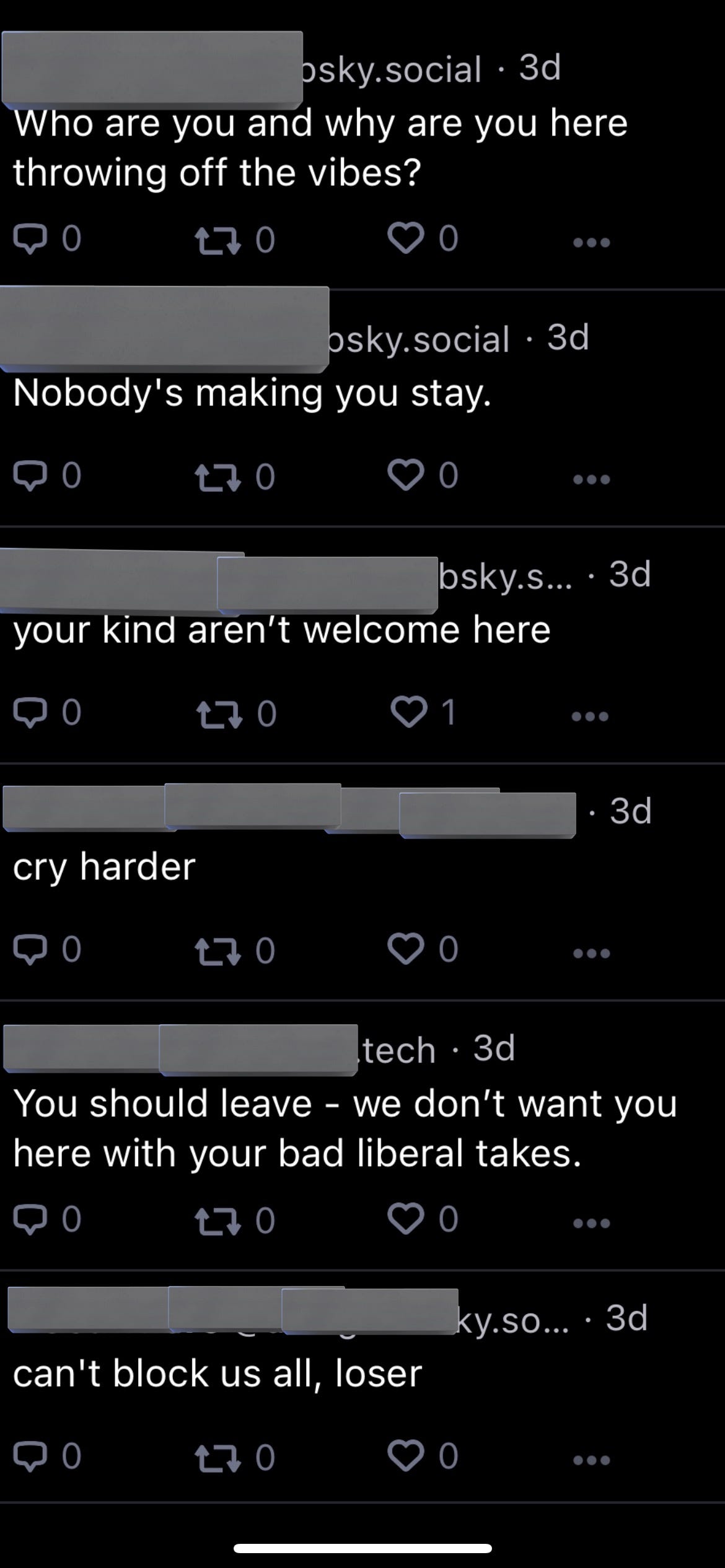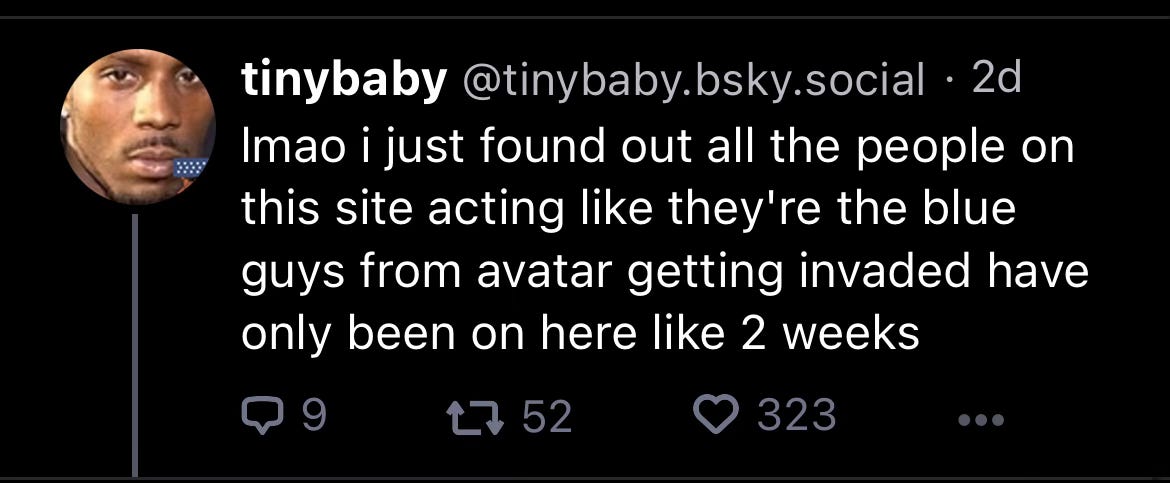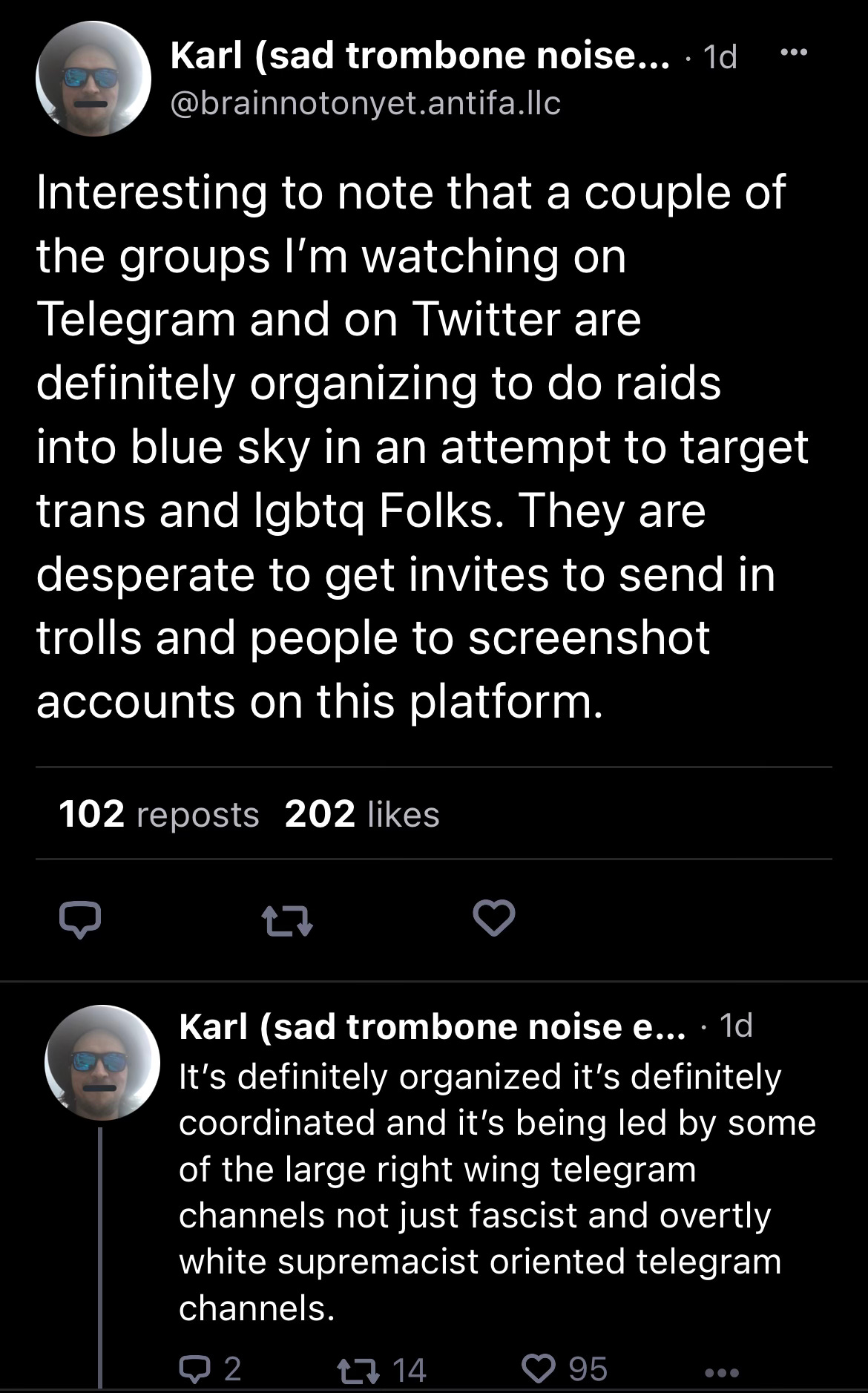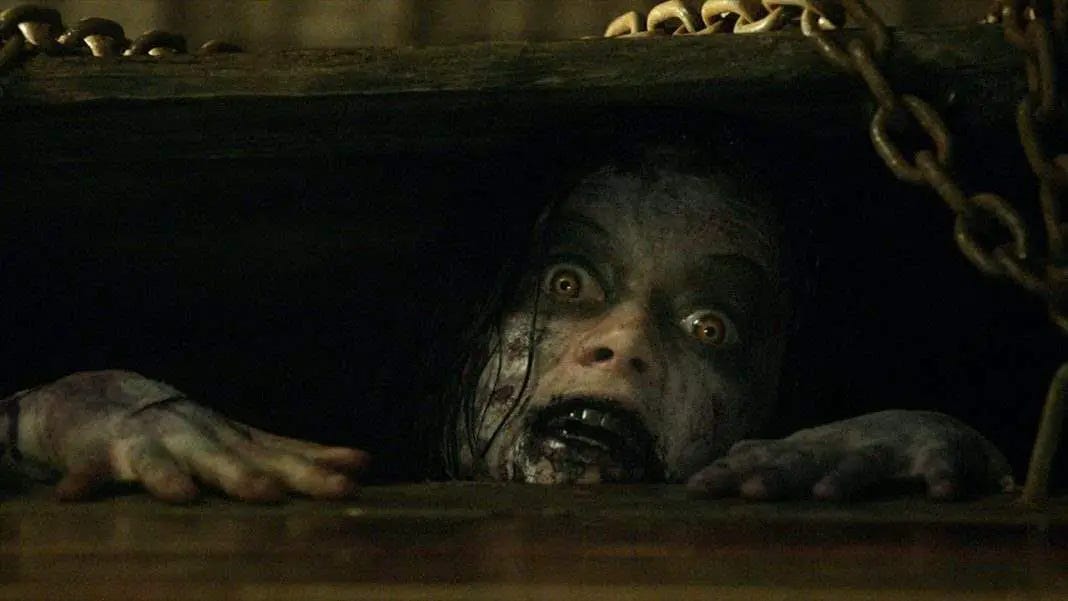Very quickly before the article — I am never going to charge for my Substack, but I am really enjoying writing on here, and I feel like if I can get a couple hundred subscribers, I might be able to start doing it more regularly (also I am not employed full-time at the moment so every little bit helps). If you feel like contributing, I would really appreciate it. If not, I still appreciate you reading. Thanks.
There are new places to post now. I’ve been trying them. I have bad news.
I tweeted something the other day, which I will have to try and recreate here because I delete most of my tweets every 36 hours or so. It said something like “I will admit to feeling complicit now in the villainy of this site’s owner, and I wish there was a reasonable alternative site to post on, but I need to be able to reach an audience that would conceivably pay for my work. Substack Notes is just as bad.”
Notes really is just as bad, possibly worse. I held out hope for about 2 days that Substack Notes might be a respite from the dross that is currently drowning Twitter. It is populated mostly by people who have newsletters, so I assued that many of them would arrive with nuanced points of view, backing up arguments with evidence, and, of course, are conscious enough of their ‘brands’ to not act ridiculous.
And then Substack’s owners shit the bed. During a podcast interview, The Verge’s EIC Nilay Patel asked Substack CEO Chris Best to just explain what kind of moderation the site will enforce, and, well, you should watch it. I’ve never seen an own goal on camera quite like this before.
Not content to flop this fantastically without backing it up, co-founder Hamish McKenzie posted a note which, well, doesn’t help. Here’s the most important graph, in my opinion:
we question the default assumption that aggressive content moderation is the answer to the problems it is supposed to solve. We’ve seen from the social media era that this method doesn’t work. In fact, it looks to us as if it is making the problems worse. Facebook, Instagram, Twitter and others have tens of thousands of engineers, lawyers, and trust & safety employees working on content moderation, and they have poured hundreds of millions of dollars into their efforts. The content moderation policies at some of those companies run to something like 150 pages. But how is it all working out? Is there less concern about misinformation? Has polarization decreased? Has fake news gone away? Is there less bigotry? It doesn’t seem so to us, despite the best efforts and good intentions of the most powerful media technology companies the world has ever known.
He followed this up by waving his hands about how the platform empowers users, how it will self-police, blahbeddyblobbedybloo. But the actual on the ground experience of Substack Notes has already curdled since its launch. Substack is home to a lot of incredibly loud, and sometimes incredibly vicious writers and readers across the political perspective, hitherto living in their own little ecosystems, and that’s what made it work. Neither the newsletter writers nor their audiences were ever meant to interact. Now, however, they’ve discovered one another on Notes, and very anodyne normal posts are collecting replies about woke ideology and how Andrew Anglin isn’t actually a nazi.
In the couple weeks since I first joined, Substack Notes already feels a bit like a ghost town, and it feels silly in retrospect that Elon Musk was so scared of it that he spoiled his relationship with willing lapdog Matt Taibbi.
On the other end of the social media spectrum, I was one of many people invited to Bluesky in the middle of last week. It’s hard to describe what Bluesky feels like at the moment, because as soon as I publish this, it will feel outdated. But I’ll give it a shot. If you aren’t on there yet (and don’t feel bad if you aren’t, it’s invite only and the ability to invite is incredibly limited at the moment for reasons I’ll explain in a minute), it’s the closest thing to a Twitter clone I’ve ever seen, although it’s pretty bare bones at the moment. There are no DMs, you can’t post video or gifs, and until this weekend, there was no block function, just a mute function.
Prior to this week, it seems that it has primarily been mostly tech sector folks, and it seems like it was a relatively placid community. And then two things happened simultaneously. The first is that people started inviting shitposters (a term I use lovingly, because what am I on social media if not a shitposter) who then turned around and started inviting their shitposter friends. The second is that some folks figured out the invite codes were pretty easy to brute force, and started just generating codes to invite their friends.
The result was that the timbre of conversation on Bluesky changed over the course of an afternoon, and the newbs started to stress test both the moderators and the site itself. The first day I was on there I saw it crashed repeatedly, and when users learned that threads of a certain length would break the site, immediately created a massive, site breaking Bluesky thread now known as the Hellthread. Several subsequent hell threads have since been born, many of them splinters of the original.
At the same time as people like Chrissy Teigan and Alexandria Ocasio-Cortez were finding their way to the site, Bluesku found its first legitimate villain in pundit Matt Yglesias. When he joined, Bluesky’s block function had not been implemented, and so he only had the power to mute literally hundreds of posts telling him to fuck off, including at least one threatening to hit him in the head with a hammer.
Both the influx of new users and the volume of new posts overwhelmed the incredibly small dev team. The hangover from all of this anarchy was that many people had their invites taken away, and Bluesky went from doling them out liberally to allowing users one invite for every two weeks on the site. The person who posted about hitting Matt Yglesias with a hammer was banned, and the dev team dropped just about everything else to roll out the block function.
The Yglesias also revealed a schism between the techposters and the shitposters, with the former saying the latter were ruining the site, and the latter telling the former to stop being big nerds and shut up. Several others were shadowbanned or had their reach limited (including Juniper, the host of Western Kabuki, a podcast I produce) as a way to keep them from rallying the troops. As of writing this, there has been an detente between the tech folks and the shitposters, with olive branches extended on both sides.
Still, the who post on Bluesky, they keep talking about just how much better it feels than Twitter. AOC skeeted about how novel it was to not experience just endless bile from people in her mentions. Everyone else remarked on how refreshing it was not to see a parade of blue checks at the top of every post giving the worst opinions they’d ever seen. For a lot of people, it felt fun to post again.
But none of this is due to the site itself, and most of it isn’t due to moderation either; In my opinion, the moderation has been mediocre, both because the team is overwhelmed and because I think that there simply aren’t any people in the tech space that understand what good moderation looks like. Instead there’s a kind of perfect storm of little reasons that Bluesky fun for the time being.
First, there’s no algorithmic surfacing of tweets that are meant to incense you into posting more or that you aren’t interested in. There’s the chronological timeline, and then there’s the “what’s hot” tab, which tends to surface recent tweets with more than 15 or so likes. Second, the userbase are all there on invites. So it’s mostly people who invited their friends and like-minded posters. Third, there’s the thrill of being a part of a thing that new and exclusive — there’s a feeling of shaping a community, and a feeling of ownership. But most importantly, the fact that it’s closed is preventing things like bots and people who deliberately want to harass and stalk. For the time being.
The plan for the future Bluesky is to actually be a decentralized platform like Mastodon. Once it is implemented, users can create their own instances of the platform where, if they are tech savvy enough, can add their own features, as well as appoint their own moderation teams. The functionality of all of it is somewhat unclear to me, but mods have said it should be easy to move between instances, but it will no longer be one big twitter-style social network.
To me this is a clear sign that the lovely experience that everyone on Bluesky is having is describing as a twitter killer, will not continue to exist once it’s opened up. First off, all the weird fighty racists will make their way in, and again, I don’t think the people who made Bluesky have it in them to moderate the main instance very well. There are already people on Bluesky threatening to invite folks like the creator of Kiwifarms, and people outside of Bluesky frothing at the mouth for a chance to ruin the experience.
Second of all, I think the posterati that is currently centralized on what is currently the only available Bluesky server are going to decamp for their preferred instances, creating less anarchy as the tech people hang out on the tech server and the journalists hang out on the journalist server and the shitposters hang out on the shitposter server. In short, the exciting controlled chaos of this closed beta is unsustainable, unless it remains closed and centralized.
I think what I have come to realize from the past few months of Twitter’s rapid decay, and my dalliances with its competitors is that most people want two different things from social media, and they are essentially irreconcilably in conflict. On the one hand, I want as vast a reach as possible - I am very glad to have had Twitter over the past decade to promote things I make, ask questions of the crowd, interact directly with people who are much too famous or obscure for me to have met any other way. I have made close friends and met musical and journalistic collaborators on Twitter. A few years ago I went on Twitter and asked what synthesizers were used to record the Unsolved Mysteries theme, and one of my followers pinged the son of one of the theme’s composers who asked his dad for me (it was a Yamaha DX-7 and a Prophet-5, if you’re curious). That kind of experience is special has never really existed anywhere else.
The downside of everyone being is one place is that everyone has as much access to you as you do to them. Every crank and weirdo on the internet can make a twitter account and start a fight with you for any innocuous post. Which is, of course, how we get twitter discourse, main characters, and so on, but it doesn’t actually feel all that fun. Posting on twitter right now is the social media equivalent of counting the seconds between lightning and thunder. You post, and then you can only hold your breath before some drive by dipshit comes by to pick a fight with you.
There was a theory in the ancient history of the internet that porn was the driving force for innovation online. The idea was that porn was so popular and lucrative, innovations came from new vectors of porn delivery and sexual gratification. Whether that was true or not, I think that what now drives internet innovation is a desire to stop bad actors from ruining communities, whether they’re trolls or governments. And everyone is hoping the next social media platform will be create a tech solution that will stop the community ruiners. But tech isn’t the solution. A clear and robustly enforced moderation policy is, and even then, moderation is a game of judgment calls, and does not scale to a site as big as Twitter.
Bluesky feels fun to the folks on it right now. For me, it hearkens back to my LiveJournal days, when it was me and couple hundred other kids attempting to escape our prosaic lives, sharing fanfiction and music recommendations and poetry and our aspirations for the future. But it’s unsustainable. I honestly think the only real viable future for internet community is to break up the monopolies social media has on socialization - the Twitters and Facebooks and Blueskies, and return to our respective little fiefdoms where we can hang out with our friends and coalesce around our shared interests, be they music, political organizing, shitposting, whatever. I’ll keep posting on Bluesky and Twitter, because, again, I need to do that to make money and accrue audience for the various things I’m working on, and I like being silly. But I don’t know that either of them feel like home. And that’s a problem. I can’t think of an experience online right now that feels like home.
I am a huge fan of the Evil Dead series, as every normal horror loving nerd is. I was 13 when Army of Darkness came out, and I worked my way backward to the first two, and now forward through the TV series, video games, reboots and remakes.
This weekend, I saw Evil Dead Rise, and I enjoyed it quite a bit. It really captures the formula of the original Evil Dead, and includes some really entertaining set pieces (special mention for a scene where we, the audience, receive all the information through a fisheye peephole). But reflecting on it, it felt a little paint by numbers.
I kept thinking back to my experience watching the 2013 Fedé Alvarez reboot of Evil Dead. It contained a lot of the hallmarks of the original trilogy — spooky cabin, fruit cellar, chainsaw — but it is so unrelenting, so mean spirited, and every time I thought it had ratcheted things as far as they could go, it just goes harder. Anyhow, I hope this one is successful enough to make a Spider-Man: No Way Home-style blending of all of the Evil Dead timelines.
See you next week… hehehehehehhehe.










It’s definitely just concentrated FOMO, but it does suck being stuck on the outside, not even being able to look in, knocking on the door while people keep sending “wish you were here” postcards through the mail slot.
All of the invites seem to have dried up and I don’t feel like I deserve to be ahead of anyone in line but it doesn’t make the wait any more tolerable.
Can we not call posting on Bluesky "skeeting" XD